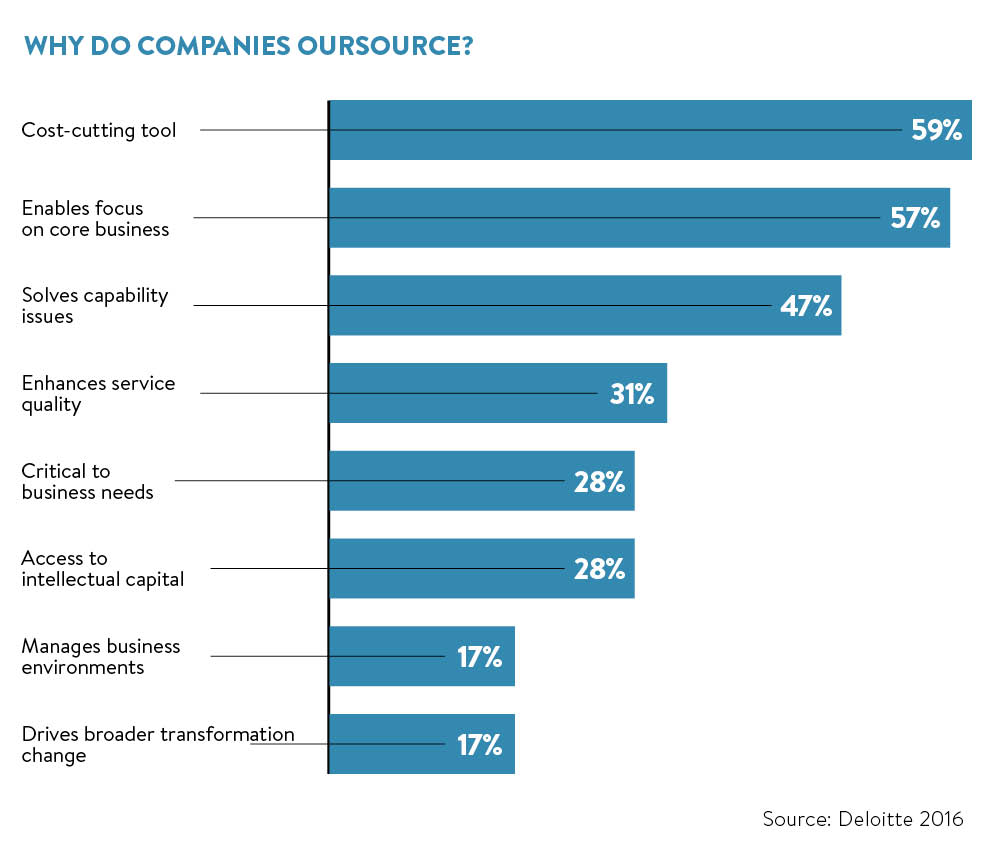Small businesses have faced an increasingly challenging operating environment in recent years. Heavier burdens of regulation and uncertain market conditions have forced many owners of small and medium-sized enterprises (SMEs) and startups to focus on becoming more nimble and remaining competitive.
Traditionally seen as the preserve of bigger businesses, smaller companies and startups have shown increased interest in outsourcing some in-house functions.
There are many benefits to SMEs and startups of outsourcing, including reducing costs and ensuring that back-office functions are looked after by individuals who are up to date with the latest legal requirements and industry practices.
Gayle Hunter, founder of Lifestyle Hunter, an online lifestyle products business, says the firm has embraced outsourcing for back-office functions.
“We didn’t want to have lots of fixed overheads as it can have a strangle hold on profitability,” she says. “I can get people to do things better than me, faster than me and in less time.”
Lean startup
Outsourcing has also been welcomed by startup companies that try to keep costs low as they establish themselves, says James Walsh, partner at law firm King & Wood Mallesons.
“Pretty much most startups are doing it. The concept that most are following, of a lean startup, is to keep costs down, improve the business model and spend money where required,” he says. This includes outsourcing when necessary rather than scaling up in-house resources.
Kathryn Moran, head of outsourcing at accountancy firm haysmacintyre, adds: “We have seen a general shift in SMEs realising that outsourcing is now a critical part of the risk management toolkit, rather than simply a means to save costs. Outsourcing provides today’s SME with a breadth of skill base and expertise not generally available to them in a single hire.”
Martin Cotterill, partner in the IT, telecoms and competition group at international law firm Taylor Wessing, says outsourcing is a viable option for any SME that is, or is growing to, a sufficient size where the support of existing staff combined with the array of third-party supply contracts will not yield the step change necessary. This applies particularly where the business needs access to a wider set of services or skills that would be too costly or risky to build itself.
“By leveraging the skills of a third-party supplier, you do not have to bear the full brunt of the investment cost yourself,” he says. “By moving more of your business support costs from a fixed cost base to more flexible, demand-driven services, you can defray the impact of volatility in your business.”
Your core value proposition should never be considered for outsourcing
The more popular back-office functions to be considered for outsourcing include payroll services, human resources administration, invoicing and technology, although most in-house services can be outsourced.
“Generally speaking any elements that are not considered core to your business may be considered,” says Mr Cotterill. “Consider that you are transferring a business process area that might be considered non-core to a specialist provider for whom such functions are the very core of their business.”
But Tony Price, partner at consultancy PwC and My Financepartner leader, says not everything should be outsourced. “I always tell clients to focus on what they’re good at – creating value. Time spent doing non-core things could be outsourced. Outsourcing can be a lot cheaper – but not always – and a bit better than what you do yourself.
“For small businesses there are some things that shouldn’t be outsourced, such as what makes the business special. Your core value proposition should never be considered for outsourcing.”
Ms Hunter adds: “I won’t outsource the design and selection of products; product development is all done by us. There are elements of marketing I won’t let go of; certain secrets that make sure we’re better than competitors – it wouldn’t be good to outsource that.”
She says her company also maintains key elements of customer support, ensuring that customers are able to talk to somebody from the firm who can deal with any issues. Listening to feedback from customers allows the business to be more responsive to new trends, one of its unique selling points.

As well as keeping control of core processes, small business owners should also be aware of their obligations under existing regulations when they do outsource in-house functions.
“Data protection laws do not prohibit or prevent outsourcing; however, an SME that is outsourcing data-rich operations, such as consumer or HR data, will have to pay close attention to its data protection obligations,” says Vinod Bange, head of UK data protection and privacy at Taylor Wessing. “To ignore this could be fatal for an SME because the data protection risk remains with the SME.”
Not all partnerships with outsourced services are successful and SMEs should be aware of remaining trapped in an agreement. Consultants recommend business owners prepare contingency plans should things not work out as expected.
“Should there be an exit strategy? We encourage everybody who is considering outsourcing to read the service level agreement,” says PwC’s Mr Price. “That agreement should be very clear about what the exit arrangements are.”
Having led the growth of the UK economy in recent years, SMEs now face a more challenging market environment with greater uncertainty. Outsourcing could enable the owners of SMEs and startups to concentrate on their key strength – running a successful business.
WHICH OUTSOURCE PROVIDER?
For smaller businesses becoming more confident in outsourcing to third parties, the number of different providers, services and products on the market came be quite daunting.
Choosing the right provider can be a difficult process and small business owners are advised to think carefully before doing a deal.
 “Expertise is key, and a familiarity with your business sector and industry,” says Martin Cotterill, partner at law firm Taylor Wessing. “Perhaps more importantly is where you would feature as a client for them and what support you might need.
“Expertise is key, and a familiarity with your business sector and industry,” says Martin Cotterill, partner at law firm Taylor Wessing. “Perhaps more importantly is where you would feature as a client for them and what support you might need.
“If you aren’t offering much in the way of volume, then perhaps going to a large, global supplier might not be the best solution, unless you are buying a standardised service from them.
“Conversely, smaller players who may not have sophisticated standardised offerings, but can provide a highly tailored solution and the attention you need, might be better for your strategy.”
Kathryn Moran, head of outsourcing at accountants haysmacintyre, says small and medium-sized enterprises (SMEs) should research a minimum of three providers before making a decision and should then arrange to test services, and agree fees and timescales.
Tony Price, PwC partner and My Financepartner leader, says SMEs and startups should talk to peers about which providers they are with and ensure prospective providers have good references from existing clients.
Entrepreneurs such as Helen Rolfe, owner of tablet accessories company Lente Designs, says providers have been proactive, but careful consideration is needed to find the right partner.
“Over the years, people had been calling and talking about products – they found us,” says Ms Rolfe, who uses Fulfilment by Amazon for logistics and shipping within the UK and overseas.
Those who consider outsourcing to providers based abroad may have to contend with some different challenges than those who choose onshore firms.
“Foreign firms continue to offer competitive pricing where their employment costs are lower,” says Ms Moran. “However, the advent and advances in technology have meant that some of these services are now accessible by SMEs in the UK, as price points have changed with efficiencies gained through technology.
“Ultimately, SMEs now have ready access to a wide range of outsourcing solutions both at home and overseas,” she says. “Language and culture continue to be considerations for the SME, and we have seen some foreign firms responding to this by investing heavily in the training of their own workforce.”
Lean startup

WHICH OUTSOURCE PROVIDER?

